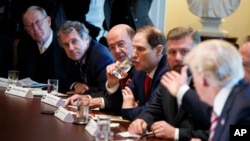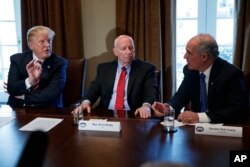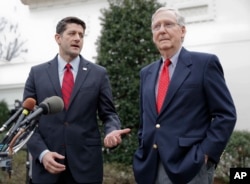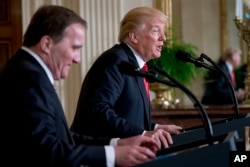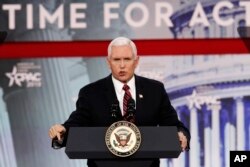U.S. President Donald Trump’s plan to impose tariffs of 25 percent on steel and 10 percent on aluminum has met criticism from his Republican allies in Congress, many of whom worry the measures could trigger a trade war that damages U.S. businesses. But the president does have supporters among some Senate Democrats from states where voters are concerned about the long-term loss of American manufacturing jobs.
“This welcome action is long overdue for shuttered steel plants across Ohio and steelworkers who live in fear that their jobs will be the next victims of Chinese cheating,” Senator Sherrod Brown, a Democrat from Ohio, said in a statement released after the plan was announced. “If we fail to stand up for steel jobs today, China will come after other jobs up and down the supply chain tomorrow.”
American labor unions have also broadly favored Trump’s proposed tariffs, saying they have been complaining for years that foreign countries frequently subsidize their own steel industries, putting American competitors at a disadvantage.
Economists have been mostly critical of the plan, saying that overall it will hurt American manufacturers, some of whom may be targeted by trading partners for retaliatory sanction. They argue that the benefits to steel and aluminum workers are outweighed by job losses among Americans in other industries.
Tariffs in focus in special election
A test of how much the issue is resonating with American voters comes next week, when voters in Pennsylvania’s 18th congressional district, vote in a special election to fill a vacated seat.
Many voters are looking to the president to fulfill his campaign promise of protecting manufacturing jobs in America’s heartland.
The race for the seat left vacant by Rep. Tim Murphy’s sex scandal is coming down to the wire between Republican candidate Rick Saccone and Democrat Conor Lamb.
Saccone’s campaign endorsed Trump’s tariff plan in a statement, saying “If other countries aren’t playing by the rules and tariffs are needed to protect steel and aluminum jobs in Southwestern Pennsylvania, Rick would support those measures.”Pennsylvania’s Democratic Senator Bob Casey also voiced his support for the president’s plan in a Facebook statement Thursday.
“I commend the President for announcing his intent to take action to protect our steelworkers from countries, like China, that cheat on trade. I have repeatedly called on this and previous Administrations to aggressively enforce our trade laws. For years, foreign countries have been dumping steel into our markets and costing our workers their jobs and suppressing their wages,” he wrote.
But Trump’s plan to impose the new tariffs prompted White House Chief Economic Advisor Gary Cohn to resign Tuesday.
McConnell, Ryan concerned
Senate Majority Leader Mitch McConnell and House Speaker Paul Ryan also expressed their concerns to the president, urging him to target the tariffs against specific countries to avoid a potential trade war.
U.S. Commerce Secretary Wilbur Ross told cable news network CNBC Wednesday the administration is not seeking a trade war.
“We’re going to have very sensible relations with our allies,” said Ross. “We hope and we believe that at the end of the day, there will be a process of working with the other countries that are our friends.”
Trump dismissed concerns about a trade war during a joint press conference with the Swedish prime minister Tuesday.
“When we’re behind on every single country, trade wars aren’t so bad,” he told reporters. “In some cases we lose on trade plus we give them military where we’re subsidizing them tremendously. So, not only do we lose on trade, we lose on military.”
The administration is considering the new tariffs under a so-called “232 report.” It allows the president to impose trade quotes or tariffs if a probe finds imports threaten national security.
'National security'
“It’s about our economy,” Vice President Mike Pence said of the need to enact tariffs, during a February meeting with lawmakers. “It’s about our national security.”
A March 7 Politico/Morning Consult poll of 2,000 registered voters, found that 65 percent of Republicans support the president’s plan.
White House Press Secretary Sarah Huckabee Sanders told reporters Wednesday the administration was still on pace to fully roll-out the tariffs at the end of this week.




